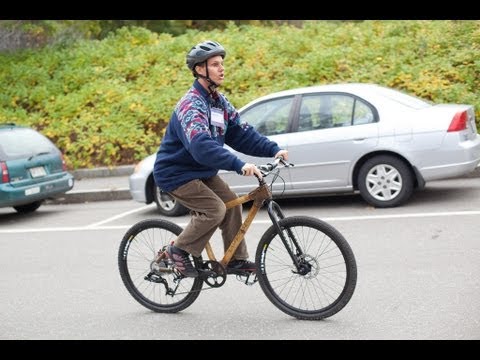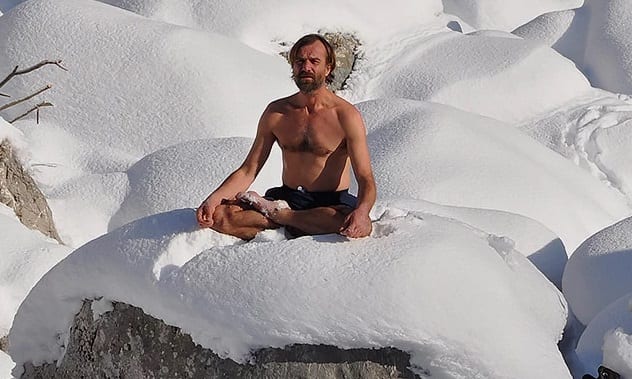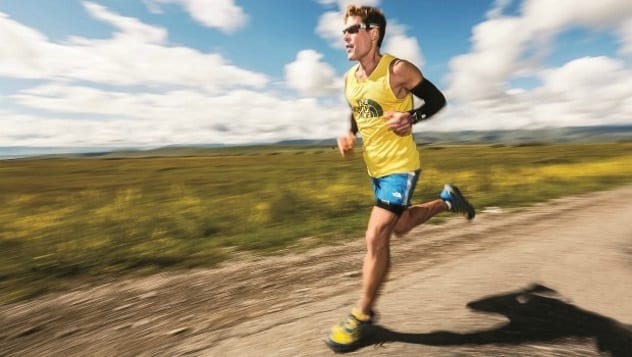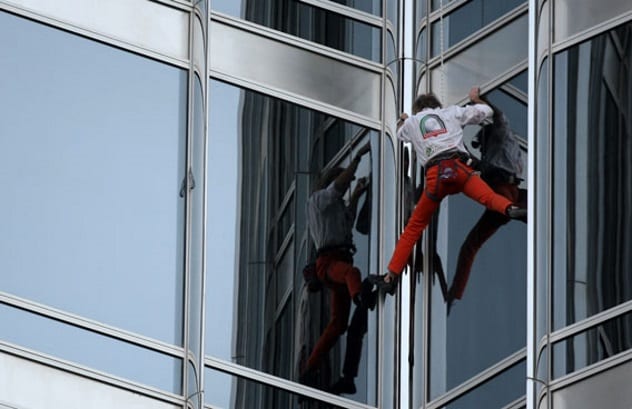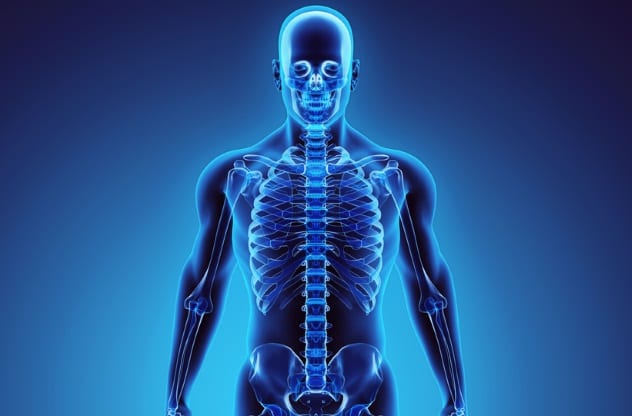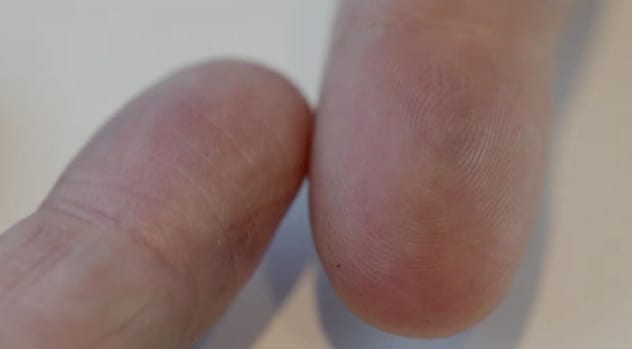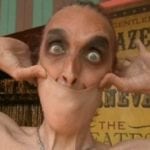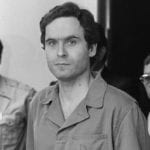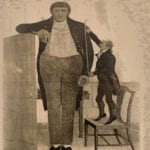And who knows, perhaps these are the tip of the iceberg. There may be lots of them, living in the shadows or hiding in plain sight, waiting for their chance to save (or destroy) the planet! Here are ten real-life people with honest-to-goodness superpowers.
10 The Real-Life Batman
As a baby, Daniel Kish developed retinoblastoma, a cancer which affects the eyes. He had to have both eyes removed before he reached his first birthday. In order to navigate his environment, Kish developed his own echolocation system, using the same techniques that bats use to fly in the dark. In fact, he has been referred to as “the real-life Batman.” As he moved around, Kish would make clicking noises with his tongue. He realized that every surface had its own sound. He could recognize a tree, for example, because the trunk produces a different echo than the branches and the leaves.[1] By listening to the echoes from his clicking, Daniel Kish is able to build a 3-D image in his mind of the objects around him. It is thought that the clicking noises activate the visual functions of the brain, which enhance spatial and depth perceptions. Kish says that he can often find his way out of a concert hall quicker than a sighted person because he can identify the exit from a long distance away. If he is in a noisy place, he just increases the volume of his clicking sounds.
9 The Real-Life Mr. Freeze
Like all good superheroes, Wim Hof discovered his superpowers by accident. When he was 17, he was walking along a frozen canal in his home city of Amsterdam when he felt a powerful urge to jump in. So he did. He soon discovered that he has superhuman ability to withstand the cold, which has led him to claim 26 world records. He tried to climb Everest in a pair of shorts. Although he made it through the Death Zone unharmed, he was forced to turn back, not by the temperature but by a foot injury. Hof has run barefoot marathons in the snow and broken his own record for ice submergence four times. Researchers studying Wim Hof’s remarkable abilities have discovered that he is able to override the stress responses in his brain through breathing and meditation techniques. When he is exposed to extreme cold, his brain releases opioids and cannabinoids into his body, inhibiting the signals that register cold and pain. What is not yet clear is how this breathing affects other physical and biological processes, such as Hof’s superhuman ability to resist frostbite, which should be unaffected by his breathing technique.[2]
8 The Real-Life Flash
Dean Karnazes can run forever. He is one of the most remarkable endurance athletes on the planet. He once ran nonstop for 563 kilometers (350 mi) over three days. He ran nonstop across Death Valley and even ran to the South Pole. Even among ultra-endurance athletes, Dean Karnazes is a superhuman. Most runners are limited by their body’s lactate threshold. The body breaks down glucose for energy, producing lactate as a by-product. When you reach your lactate threshold, the body is no longer able to convert the lactate quickly enough, leading to an acid buildup in the muscles and a burning pain runners call “hitting the wall.” Running beyond your lactate threshold will lead to muscle fatigue, breathlessness, and a racing heart, until eventually you collapse in a sweating, gasping heap. Dean Karnazes does not have a lactate threshold, which means that, theoretically, he can run forever. Karnazes has never experienced any form of cramp or muscle ache, even during runs that last more than 160 kilometers (100 mi). The only thing that stops him is his need for sleep, and he has even sometimes experienced bouts of “sleep running,” where he was able to keep on moving while nodding off.[3]
7 The Real-Life Spider-Man
Nicknamed the “French Spiderman,” Alain Robert is one of the best climbers on Earth. He is famous for his free solo-climbing exploits up skyscrapers, without the use of ropes or safety harness. The only “equipment” that he carries is a bag of chalk dust. Robert has climbed over 160 skyscrapers, including the Burj Khalifa in Dubai, the Taipei 101 in Taiwan, and the Lloyd’s building in London.[4] Robert was arrested in October 2018 after scaling the Salesforce Tower in London. He climbed the 202-meter (662 ft) tower without safety equipment, while a crowd gathered below to watch him. Though he reached the top safely, he was soon arrested “on suspicion of causing public nuisance.” Following a court hearing after the stunt, which only took around 45 minutes to complete, Robert was banned from climbing any building in the UK, which seems a shame. But, then again, the world is full of friendly neighborhoods with tall buildings.
6 The Real-Life Professor X
The actress Marilu Henner has superhuman mental powers. She has Highly Superior Autobiographical Memory (HSAM), an extremely rare condition which allows her total recall of basically every single moment of her life. Fewer than 100 people with the condition have been documented worldwide. Though HSAM would make life easier in many ways (imagine never having to wonder where you put your car keys), there are some disadvantages, too. People with HSAM are more likely to have anxiety disorders and suffer from depression or OCD. Marilu Henner can recall the month, day, and time of every event that has happened in her life and can also recall things that were on the news or happened to other people. She first became aware of her ability at the age of six. MRI tests have revealed that people with HSAM have larger temporal lobes and caudate nuclei than normal, but researchers are not sure whether this is the cause or the result of living with the condition. Whatever the cause, Henner has found living with HSAM pretty useful at times, particularly when learning lines.[5]
5 The Real-Life Elastigirl
Javier Botet is a Spanish actor with a peculiar gift. His extremely long limbs and lean body give him the look of a human skeleton. When he made a screen test in 2013, many people assumed that they were watching a puppet because Botet was able to move his limbs in very unexpected and disturbing ways. Botet suffers from Marfan syndrome, which results in hyperflexibility. His condition has allowed him to carve out a career in horror movies, where he has appeared as aliens, lepers, monsters, and mummies, as well as the urban folklore-inspired Slender Man. He first noticed the condition as a child and liked to fold his arms and legs into unusual shapes.[6] (Well, we all need a hobby.) Marfan syndrome is a rare genetic disorder, resulting in extreme height and slenderness as well as hyperflexibility. It can also cause heart defects and blindness. For the moment, however, Javier Botet is using this elastic powers to conquer Hollywood.
4 The Real-Life Overseer
An unnamed family from Connecticut has been the center of much study by genetic scientists due to their unusually high bone density. Just like Bruce Willis in Unbreakable, the family has a genetic mutation that means their bones never break. No one in the family has ever had a fracture, and it is thought that they have the strongest bones on the planet, which is impressive. It appears that the condition is genetic. Scientists tested 20 members of the family, with just under half of them being found to have extra dense bones. It is hoped that by studying the DNA of those family members with the condition, researchers will be able to more fully understand the factors affecting bone density, which could lead to treatments for osteoporosis.[7] The condition means that the Connecticut family will never need a plaster cast, though they may find themselves spending a lot of money on plastic ponchos. (That’s an Unbreakable joke.)
3 The Real-Life Invisible Woman
It is a universally accepted truth that we all have a unique set of fingerprints. Even identical twins differ when it comes to the minute whorls and loops on a set of dabs. Modern technology has made use of this unique property when it comes to things like cybersecurity, which must make Cheryl Maynard feel pretty invisible.[8] Fingerprints are usually fully formed even before we are born. People with adermatoglyphia, however, are born with no fingerprints. (In the picture above, Cheryl’s finger is compared with a normal one.) It is believed that there are only four extended families in the world with this condition, caused by a genetic mutation. The condition has left Cheryl Maynard feeling pretty invisible. Having no fingerprints has even made it difficult for her to get jobs. However, if she fancied a career as a criminal, she would have a head start.
2 The Real-Life Vision
In 1972, when Veronica Seider claimed to be able to see small objects 1.6 kilometers (1 mi) away, no one believed her. However, eyesight is pretty easy to test, so it soon became clear that Seider’s vision was truly exceptional. She was soon listed by Guinness World Records with eyesight 20 times more powerful than normal human beings. Not only is she able to distinguish people and objects from 1.6 kilometers (1 mi) away, but she is also able to judge distance and position, which can be useful. And she can distinguish the individual colors that make up the color on a television set. Not so useful.[9]
1 The Real-Life Deadpool
Okay, well maybe this isn’t exactly like Deadpool, but a woman identified only as “SM” has a condition known as Urbach-Wiethe, which has damaged parts of her brain. As a result, she feels no fear. At all. Totally fearless. The condition manifested first as a complete lack of fear from all external stimuli—such as the large, venomous spiders and snakes she picked up as a child. Once, when she was being held up at knifepoint, her attacker was so unnerved by her lack of fear that he let her go. Like all superheroes, however, SM does have one weakness. After a barrage of tests where she had shown no fear responses, she was exposed to carbon dioxide and suddenly had a panic attack. Neurologists studying her brain hypothesized that impending suffocation finally produced a fear response where no other stimuli could. However, when the test was repeated, SM did not show any anxiety until the gas started to take effect, proving that her response had been a physical reaction to suffocation rather than a psychological manifestation of fear.[10] It could be worse. She could be afraid of cows. Ward Hazell is a writer who travels, and an occasional travel writer.
